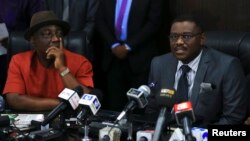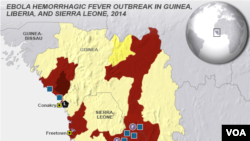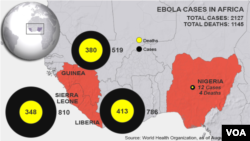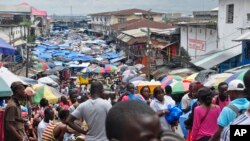The health situation could be turning the corner in Nigeria, nearly a month after an Ebola-infected air traveler from Liberia brought the disease to Lagos.
Four people have since died of the virus there, but the health ministry said Monday that five others now have completely recovered. There have been a total of 12 confirmed cases. Public health experts say Nigeria has acted fast to contain the situation, though they admit more can be done.
Meanwhile, fear of disease has spread even into the country's churches.
Talking about Ebola, Simeon Uzih, a parishioner at St. Peter’s Catholic Church in Oleh, said “for now, we just say 'the peace of the Lord be with you and also with you.' We just look at each other, but no hand shake just to prevent the spread of the disease.”
The deadly disease can be spread through contact with a sick person’s bodily fluids. Governments around the region are advising people not to shake hands or hug. Uzih said he's not taking any chances, not even at church.
Public health experts say this is no time for Nigeria to get complacent.
Public education efforts
Nearly 200 people there remain under surveillance. Authorities believe they have found everyone who may have been exposed to Ebola since that infected air traveler arrived in Lagos on July 20.
The leader of the U.S. Center for Disease Control’s team in Lagos, John Vertefeuille, said Nigeria has “hit a stable period.”
“We’ve benefited from being able to trace every case that’s come in so far to that initial index case. We are using this period for preparedness, preparedness in case things did take a turn for the worse to make sure that the teams are in place to respond accordingly,” said Vertefeuille.
He said the contact-tracing team is more than doubling this week to 200 people.
Suspected Ebola patients have been moved to a new, clinical ward in Lagos. It has 40 beds -- more than enough for the current caseload -- though the government has plans to expand it even further just in case they are needed.
The regional outbreak is far from over.
Experts say Nigeria should focus, in particular, on public education.
There is an Ebola hotline, and the government is using Facebook and other media to get the word out. But misinformation continues. Text messages have been going around advertising false cures like drinking or bathing in salt water.
Dr. Chikwe Ihekweazu, an infectious disease expert who runs the web site Nigeria HealthWatch, “These rumors need to rebutted firmly. and quickly and they need to be in our faces. I think they are not doing enough of it. Some of it has started happening but … at the moment it feels like rumors are two, three steps ahead of us and it takes three, four days for the government to respond to any of these.”
Urgent vigilance
Nigeria is Africa’s most populous country with more than 150 million people. It also is the biggest economy in the region.
The outbreak currently raging in Liberia, Sierra Leone and Guinea is already unprecedented and out of control. Public health experts shudder to think what a large-scale outbreak in Nigeria could mean.
Lagos alone is a densely populated city of some 20 million people, where experts say the virus could spread rapidly if given the chance.
Hilary Uguru reported from Warri, Nigeria.







